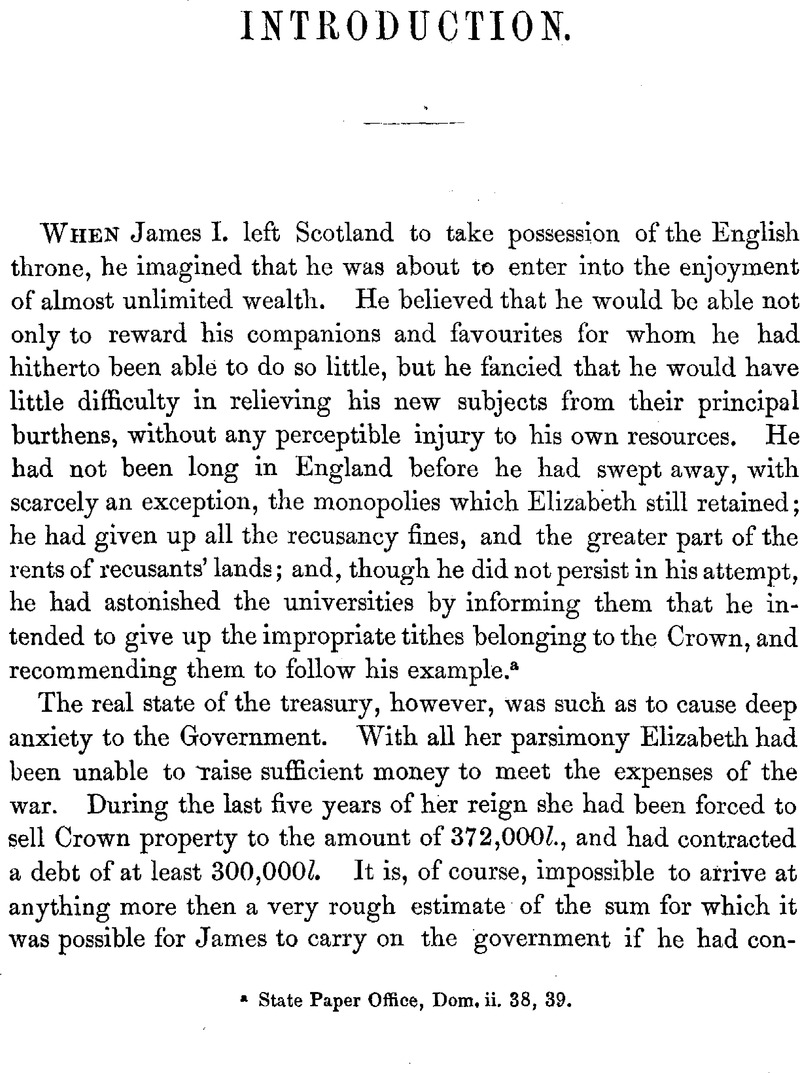No CrossRef data available.
Article contents
Introduction
Published online by Cambridge University Press: 23 February 2010
Abstract

- Type
- Introduction
- Information
- Camden Old Series , Volume 81: Parliamentary Debates in 1610. Edited, from the notes of a Member of the House of Commons , August 1862 , pp. ix - xx
- Copyright
- Copyright © Royal Historical Society 1862
References
page ix note a State Paper Office, Dom. ii. 38, 39.
page x note a The first five items are calculated on the rate of the expenditure of James during the first few years of his reign; the sum set down for Ireland being exclusive of repayment of debt, or of the expenses of the new coinage, which was, in fact, only repayment of debt under another form. The next nine items, being those in which James's extravagance would be chiefly shown, are calculated on the expenditure of Elizabeth. The expenses of the Queen and Royal Family are of course new. I have set them at a far lower amount than they actually reached as soon as the Princes and the Princess began to grow up. The principal sources which I have made use of have been the Issue Books of the Exchequer, and the papers in the State Paper Office; especially Dom. xxxv. 29.
page xi note a Here and elsewhere in the course of the Introduction, when I speak of the ordinary revenue or expenditure, I mean the amount specified in the Issue Books, after adding 32,0001. the average receipts and payments of the Court of Wards and the Duchy of Lancaster; and after deducting the subsidies and fifteenths, and all money received from irregular sources, such as Spanish prize money, sales of lands, &c. and all money paid out in gifts or other grants of an extraordinary nature.
page xi note b i.e. the financial year, beginning on Easter day.
page xii note a State Paper Office, Dom. xl. 48. I have condensed the account by throwing several of the items together.
page xiii note a This does not represent the whole of the wine consumed, but only certain supplies which were not included in the Cofferer's account
page xiii note b Add. MSS. 12,497, fol. 155. This does not take into account the value of lands granted; CAMD. SOC.
page xiv note a Lansd. MSS. 156, fol. 121-123. The sum given is 40,6761. 19s. 2d., but this includes 10,0001. granted to the Queen.
page xv note a Add. MS. 12,497, fol. 136.
page xv note b Account of the King's debts, State Paper Office, Dom. lii. 6. This was the highest point the debt reached in Salisbury's time. I cannot give the exact sum, as the debt is calculated up to Michaelmas in each year. The paper concludes with a statement that, at Michaelmas, 1609, the debt reached 1,465,4191., and these figures were made use of by Salisbury in his financial statement. It only means that the debt would have reached this sum if none had been paid off. The sum given in the text is obtained by making the necessary corrections with the help of the Issue Books.
page xvi note a State Paper Office, Dom. iv. 46.
page xvii note a State Paper Office, Dom. vi. 69; x. 27.
page xvii note b State Paper Office, Dom. Docquets, July 23, and Nov. 10,1604.
page xvii note c State Paper Office, Dom. xv. 4.
page xvii note d State Paper Office, Dom. xv. 54.
page xvii note e There is a copy of the letters patent, dated Dec. 14,1605, among the Add. MSS. (No. 20,031).
page xviii note a One evidence of Coke's assent, given in a similar case, to the doctrine propounded, is not generally known. About 1604 (State Paper Office, Ireland, undated), the city of Dublin sent over to England a collection of grievances. In the answer sent is the following clause: “For the impost of wines His Majestie may impose the same without any statute.” This is signed by Popham and Coke.
page xviii note b See Appendix B.
page xviii note c This appears from a note in one of the papers in the State Paper Office, Dom. ccxi. In referring to these abstracts it must be remembered that they do not profess to give the accounts of the Court of Wards and the Duchy of Lancaster, and that in the receipts the assignations are omitted.
page xviii note d I do not know what the exact reduction was, but it must have been considerable, as the farm fell from 2,0001. to 4001.
page xix note a State Paper Office, Dom. xl. 48.




